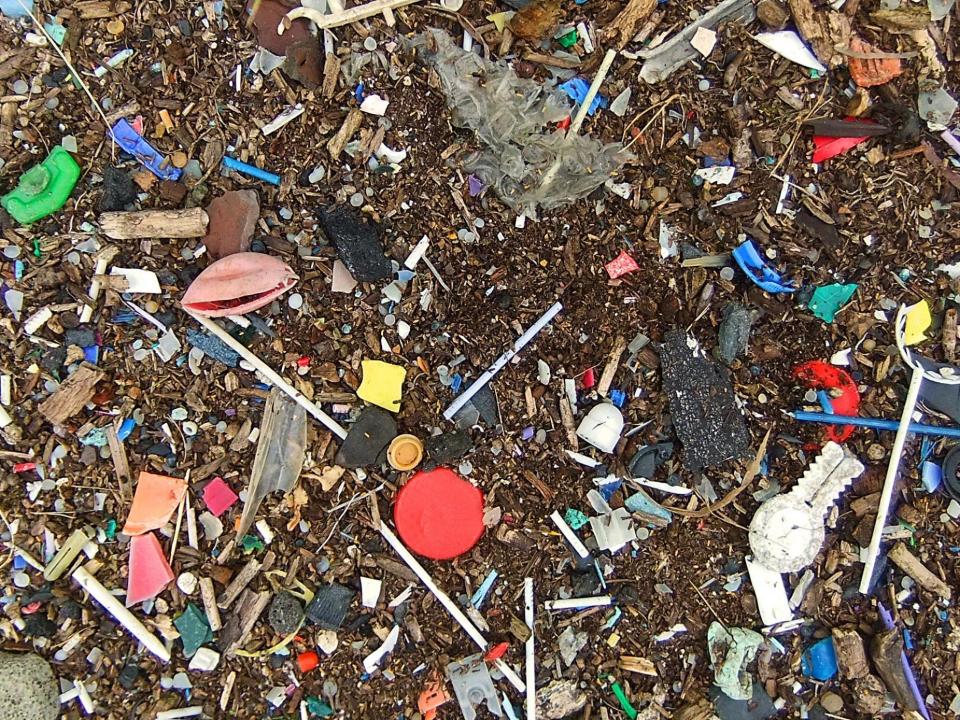Plastic waste swamping UK rivers, with one waterway more polluted than Great Pacific Garbage Patch, report says
British rivers are so polluted with waste almost all samples contain microplastics, and one is more choked with a higher concentration of plastic than the “Great Pacific Garbage Patch”, the world’s largest accumulation of floating debris in the north-central area of the ocean, a report has found.
The study of 13 UK rivers by Greenpeace revealed they all had microplastics in them, but the River Mersey, which runs from Stockport, through suburban Manchester and empties into Liverpool Bay, was found to be the most contaminated.
Researchers pulled an astonishing 875 pieces of plastic from the river in half an hour, using specially designed nets.
Greenpeace is calling for the government to introduce “bold” new plastic reduction targets and create an independent watchdog with powers to enforce them.
Scientists and campaigners sampled points along the rivers Exe, Thames, Severn, Great Ouse, Trent, Mersey, Aire, Derwent, Wear, Conwy, Wye, Clyde, and Lagan.
Analysis of the samples by scientists at the University of Exeter using an infrared detector found microplastics were in 28 out of 30 locations tested.
A total of 1,271 pieces of plastic ranging from fragments of straws and bottle tops to tiny microbeads less than 1mm across in size were fished out of the rivers.
Greenpeace said the concentrations of plastic waste in the Mersey were recorded at 2 million microplastics per square kilometre, making it proportionally more polluted than the Great Pacific Garbage Patch.
Greenpeace ocean plastics campaigner Fiona Nicholls said: “When processing the samples, I remember thinking that this was an outrageous amount of microplastics, just hundreds and hundreds of microplastics nestled among the twigs, leaves and feathers that were also making their way down the river.
“During this campaign we witnessed voles eating plastic, swans using it to build their nests, and caddisfly larva using it to make their protective casings.”
She added: “Fiddling around the edges of the plastic pollution problem by banning straws simply doesn’t cut it.
“We need to see bold new plastic reduction targets in the upcoming environment bill, and aim to at least halve single-use plastic production by 2025.”
The research team tested a minimum of two locations on each river and sent the samples for analysis at a laboratory at the University of Exeter.
More than four-fifths of the polymers found by Greenpeace were polyethylene, polystyrene and polypropylene, which are used to make products such as food packaging, milk and water bottles and carrier bags.
The research comes immediately after the countries of the G20 signed up to a voluntary agreement pledging action to tackle the torrent of plastic washing into the world’s oceans, where it decimates wildlife and ruins ecosystems.
The growth in single-use consumer plastics has fuelled a surge in plastic pollution around the world. It is estimated there are now 5.25 trillion pieces of ocean plastic debris, and a recent report estimated the quantity of plastic in the sea will treble by 2025.
Around 40 per cent of plastics are thought to enter the waste stream in the same year they are produced.
A spokesman for the Environment Department (Defra) said: “The UK is a global leader in tackling plastic pollution and is already making great strides – banning microbeads in rinse-off personal care products, taking fifteen billion plastic bags out of circulation with our 5p carrier bag charge, and announcing plans to introduce a deposit return scheme for single use drinks containers.
“We know there is more to do, which is why we are funding ground-breaking research into how microplastics enter waterways and working with the water industry to find new methods to detect, measure and remove microplastics from wastewater.”
Additional reporting by PA

 Yahoo News
Yahoo News 

